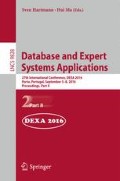Abstract
The paper provides a contribution in computing consistent answers to logic queries in a P2P environment. Each peer joining a P2P system imports data from its neighbors by using a set of mapping rules, i.e. a set of semantic correspondences to a set of peers belonging to the same environment. By using mapping rules, as soon as it enters the system, a peer can participate and access all data available in its neighborhood, and through its neighborhood it becomes accessible to all the other peers in the system. The declarative semantics of a P2P system is defined in terms of minimal weak models. Under this semantics each peer uses its mapping rules to import minimal sets of mapping atoms allowing to satisfy its local integrity constraints. The contribution of the present paper consists in extending the classical notion of consistent answer by allowing the presence of partially defined atoms, i.e. atoms with “unknown” values due to the presence of tuples in different minimal weak models which disagree on the value of one or more attributes. The basic proposal is the following: in the presence of alternative minimal weak models the choice is to extracts the minimal consistent portion of the information they all hold, i.e. the information on which the minimal weak models agree. Therefore, true information is that “supported”’ by all minimal weak models, i.e. the set of atoms which maximizes the information shared by the minimal weak models.
Access this chapter
Tax calculation will be finalised at checkout
Purchases are for personal use only
Notes
- 1.
A built-in atom is of the form \(X \theta Y\), where X and Y are terms and \(\theta \) is a comparison predicate.
References
Bernstein, P.A., Giunchiglia, F., Kementsietsidis, A., Mylopulos, J., Serafini, L., Zaihrayen, I.: Data management for peer-to-peer computing: a vision. In: WebDB, pp. 89–94 (2002)
Calvanese, D., De Giacomo, G., Lenzerini, M., Rosati, R.: Logical foundations of peer-to-peer data integration. In: PODS Conference, pp. 241–251 (2004)
Caroprese, L., Greco, S., Zumpano, E.: A logic programming approach to querying and integrating P2P deductive databases. In: FLAIRS, pp. 31–36 (2006)
Caroprese, L., Molinaro, C., Zumpano, E.: Integrating and querying P2P deductive databases. In: IDEAS, pp. 285–290 (2006)
Caroprese, L., Zumpano, E.: Consistent data integration in P2P deductive. In: SUM, pp. 230–243 (2007)
Caroprese, L., Zumpano, E.: Modeling cooperation in P2P data management systems. In: An, A., Matwin, S., Raś, Z.W., Ślȩzak, D. (eds.) Foundations of Intelligent Systems. LNCS (LNAI), vol. 4994, pp. 225–235. Springer, Heidelberg (2008)
Caroprese, L., Zumpano, E.: Handling preferences in P2P systems. In: Lukasiewicz, T., Sali, A. (eds.) FoIKS 2012. LNCS, vol. 7153, pp. 91–106. Springer, Heidelberg (2012)
Caroprese, L., Zumpano, E.: Restoring consistency in P2P deductive databases. In: Hüllermeier, E., Link, S., Fober, T., Seeger, B. (eds.) SUM 2012. LNCS, vol. 7520, pp. 168–179. Springer, Heidelberg (2012)
Caroprese, L., Zumpano, E.: A logic based approach for restoring consistency in P2P deductive databases. In: Chen, Q., Hameurlain, A., Toumani, F., Wagner, R., Decker, H. (eds.) DEXA 2015. LNCS, vol. 9262, pp. 3–12. Springer, Heidelberg (2015)
Franconi, E., Kuper, G.M., Lopatenko, A., Serafini, L.: A robust logical and computational characterisation of peer-to-peer database systems. In: Aberer, K., Koubarakis, M., Kalogeraki, V. (eds.) DBISP2P 2003. LNCS, vol. 2944, pp. 64–76. Springer, Heidelberg (2004)
Gelfond, M., Lifschitz, V.: The stable model semantics for logic programming. In: Proceedings of the Fifth Conference on Logic Programming, pp. 1070–1080 (1998)
Sakama, C., Inoue, K.: Prioritized logic programming and its application to commonsense reasoning. Artif. Intell. 123, 185–222 (2000)
Author information
Authors and Affiliations
Corresponding author
Editor information
Editors and Affiliations
Rights and permissions
Copyright information
© 2016 Springer International Publishing Switzerland
About this paper
Cite this paper
Caroprese, L., Zumpano, E. (2016). Generalized Maximal Consistent Answers in P2P Deductive Databases. In: Hartmann, S., Ma, H. (eds) Database and Expert Systems Applications. DEXA 2016. Lecture Notes in Computer Science(), vol 9828. Springer, Cham. https://doi.org/10.1007/978-3-319-44406-2_30
Download citation
DOI: https://doi.org/10.1007/978-3-319-44406-2_30
Published:
Publisher Name: Springer, Cham
Print ISBN: 978-3-319-44405-5
Online ISBN: 978-3-319-44406-2
eBook Packages: Computer ScienceComputer Science (R0)

